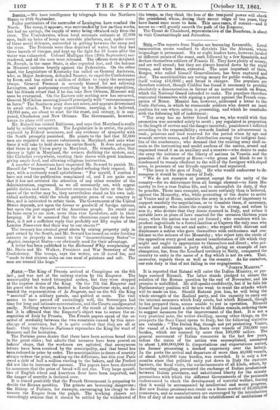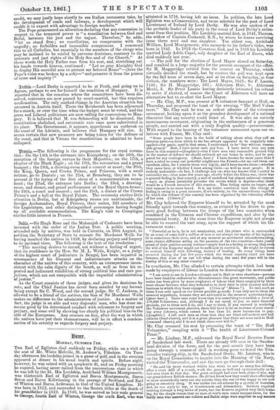Sta14.—The reports from Naples are becoming favourable. Loc a l insurrection seems
confined to distlicts like the Abruzzi, where brigandage is "permanent. Six or eight leaders have, however, landed at different points of the coast, each followed by a few Spaniards, and declare themselves soldiers of Francis II. They have plenty of money, and are well armed; but they are always hunted down by the royal troops, and when taken, executed. The most important of them, Borges, who called himself Generalissimo, has been captured and shot. The municipalities are voting money for public works, Naples itself. voting 416,0001.; and bread is cheerier. The populace are therefore content, though Cialdini has found it necessary to prohibit absolutely a demonstration in favour of an instant march on Rome, which the National Guard intended to make. The populace therefore contented themselves with signing a protest against the French occu- pation of Rome. Mazrini has, however, addressed a letter to the Unita Raliana, in which he commends soldiers who desert an inert position for one where action is proceeding, and which he concludes with the following bill of indictment:
"The army has no better friend than we, who would wish that promotion was accorded solely to merit ; pay regulated in proportion to the length of service and the danger incurred; punishment inflicted according to the responsibility; rewards limited to advancement in rank; pensions and land reserved for the period when by age and wounds service ceases, and for distribution among the indigent fami. lies of the combatants; who demand that the existing army shall re- main as the instructing and model nucleus of the nation, armed and organized round it as an auxiliary and a reserve—who desire to make the army the initiator of the liberty of nations in Venetia and the guardian of the country at Rome—who groan and blush to see it condemned to remain obedient to the will of the foreigner with sloped arms, in presence of our friends oppressed and separated. "The army is the gem of Italy. He who would endeavour to de- compose it would be the enemy of Italy. "We do not conspire at present except for the unity of the country—for its deliverance from all foreign element—to force Mo- narchy to live a true Italian life, and to accomplish its duty, if that be possible. Those men conspire, and more certainly than is believed, against the Monarchy, who, while protesting of the desire to arrive at Venice and at Rome, maintain the army in a state of impotency to support manfully the negotiations, or to translate them, if necessary, into a menace; who desire the country to be strong, and refuse to arm it; who declare that they desire concord in Italy, and refuse it suitable laws in place of laws enacted for the occasion thirteen years since, when the nation was not yet formed ; who condemn with im- prudent ingratitude to a forced inaction at Caprera the only man who at present in Italy can act and unite; who regard with distrust and displeasure a nation who gave themselves with enthusiasm and con- fidence to the colours of the Monarchy; who reject into the circle of the opposition every good and sacred manifestation of life which they might and ought to appropriate to themselves and direct ; who per- secute and calumniate a party which, giving an example of rare abnegation, has, from the Lombard territory to Sicily, conquered the country to unity in the name of a flag which is not its own. That, moreover, regards them as well as the country. As for ourselves, our sole duty is that of not failing in our engagements.
JOSEPH MAZZINI."
It is reported that Ratazzi will enter the Italian Ministry, or per- haps succeed Ricasoli. The latter stands pledged to secure the solution of the Roman question by the end of November, and his promise is unfulfilled. He still speaks confidently, but if he fails his Parliamentary position will be too weak to resist the attacks which will be made on him. Should Ratazzi join him, he will bring the whole strength of the Radical party, and the capacity to carry out the internal measures which Italy needs, but which Ricasoli, though he has prepared them, seems unable to put in operation. Ricasoli himself has just issued a circular to all Italian consuls, ordering them to suggest measures for the improvement of the fleet. It is not a very practical note, the writer dwelling, among other things on the prospects the Suez Canal opens to Italy, but the following things, are valuable : "The Italian flag, though not yet protecting Venice, the vassal of a foreign nation, floats over vessels of 700,000 tons burden, which are manned by more than 100,000 sailors. The general movement of Italian commerce in the last few years, before the union of the nation was accomplished, amounted to about 1,400,000,000 fr. (importations and exportations united, the former presenting a marked superiority over the latter). In the ports the arrival and departure of more than 40,000 vessels, of about 4,000,000 tons burden, was recorded. It is only a few months since that political unity put down in Italy the customs barriers, the fiscal visits, the embarrassments of all kinds, vthich, by favouring smuggling, prevented the exchange of Italian productions between Italian provinces, and substituted liberty for the minute precautions with which the .different Governments of the peninsula endeavoured to check the development of material welfare, fearing that it would be accompanied by intellectual and moral pro But now Italian produces can count on a home market of 23,00 ,000 consumers, and as manufacturers are encouraged by the introduction free of duty of raw materials and the establishment of institutions of
credit, we may justly hope shortly to see Italian commerce take, by the development of roads and railways, a development which will enable it to export with advantage to foreign markets." The Pope pronounced an allocution declaring that any concession in respect to the temporal power is "a conciliation between God and Rehal, between the just and the unjust. Therefore," he adds, "let us stand firm ; no conciliation, no compromise with the ungodly; no forbidden and impossible compromise. I commend this to all Catholics, but especially to the members of the clergy who may be inclined to be misled by perverse doctrines, contrary to the interests and just rights of the Holy See and of the Church." At these words the Holy Father rose from his seat, and, stretching out his hands towards heaven, continued : "Let us pray Almighty God to display His merciful arm to protect my beloved Rome"—(here the Pope's voice was broken by a sob)—" and preserve it from the poison of error and impiety !"































 Previous page
Previous page